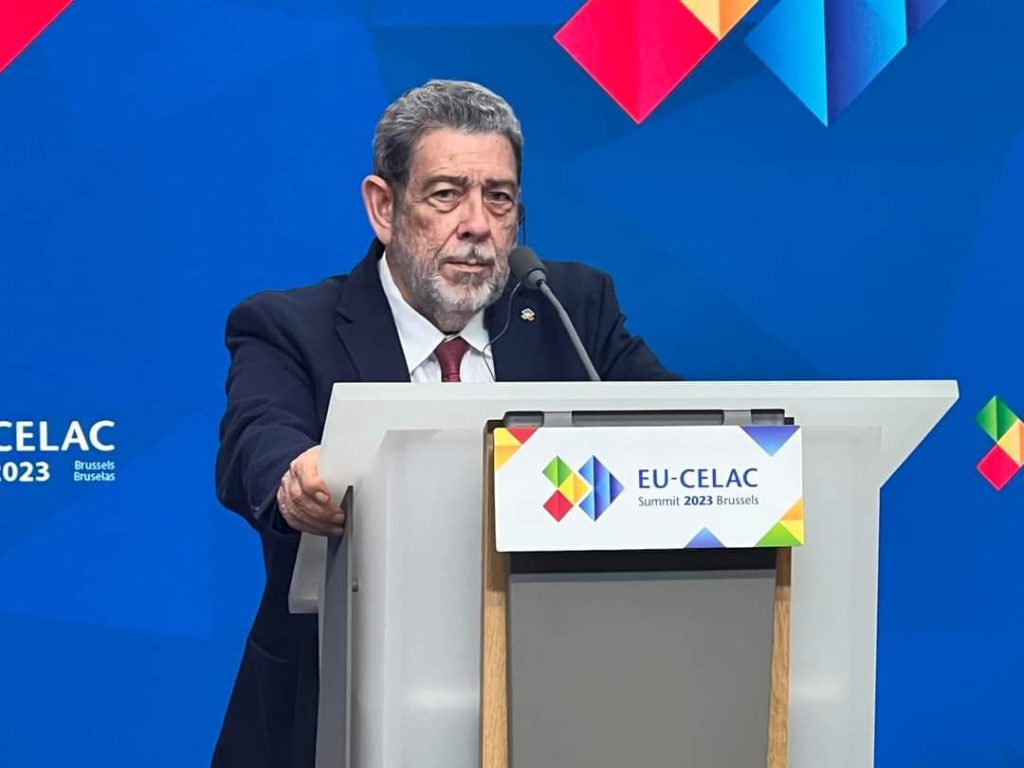
The Heads of State and Government of the member-countries of the European Union (EU) and the Community of States of Latin America and the Caribbean (CELAC) are here gathered in Brussels in quest of the further improvement of the lives and livelihoods of our respective peoples and all humanity. We are the leaders of sixty countries — almost one-third of the membership of the United Nations comprising some 1.25 billion people or roughly 16 percent of the world’s population, and possessed of 20 percent of the world’s Gross Domestic Product (GDP). We can truly make a difference for the better, for all, if we are genuinely committed to act, respectfully and honestly, through an uplifting multilateralism, in accord with the fundamental precepts of international law, and in pursuance of the requisites of peace, prosperity, sustainable development, and security. Each of these words is pregnant with real meaning. I have not dusted them off as diplomatic gloss. Strategically, the EU and CELAC have the potential, jointly, to engender an efficacious and constructive multipolarity for a better world.
We are assembled at a time of terrifying global turmoil of war and discord, a broken and unworkable financial architecture, and the awesome contemporary challenges of an existential kind, particularly those relating to climate change, pandemics, poverty, food insecurity, citizen security, inequity between and within nations, injustices galore, inclusive of those with awful historical legacies lodged in native genocide and the enslavement of African bodies, and the debilitating downsides, misuse and abuse of aspects of technological innovations. Still, we in the EU and CELAC possess possibilities and strengths amidst our limitations and weaknesses; and together, in concert with other nations, we can devise and implement solutions for a better world, for all humanity, not only for a privileged minority in a few nations. But for us to succeed we must put an end to the wholly unacceptable notion that the strong, with impunity, do what they can and the weak suffer, ignominiously, what they must.
It is an historical fact that Europe remade Latin America and the Caribbean, and in the process remade itself. Out of this cauldron of remaking, most of Europe was, and still is, overwhelmingly the lop-sided beneficiary, in a relationship in which our Latin America and our Caribbean have been, and are, unequally yoked.
This Summit ought to acknowledge this unequal yoking and accordingly advance sustainable correctives on several fronts in a mutually-beneficial manner but with especial consideration for those among us who historically have been, and are, disadvantaged. Elemental justice and enlightened self-interest so dictate.
Hopefully, this Summit will arrive at mutually satisfactory conclusions on a bundle of compelling issues touching and concerning, among other things: Inclusive, sustainable development; hunger and food security; a meaningful reform of the global financial architecture in accord with the central thrust of the Bridgetown Initiative; renewable energy; ramped-up ambitions and actions on climate change, mitigation and adaptation; tangible delivery on commitments to climate finance and loss and damage funding for vulnerable countries; public health and pandemics; education, science and technology; the frontiers and resources of space and the deep seabed; marine transport; the digital transition; reparatory justice for native genocide and the enslavement of African bodies; the cessation of unilateral, coercive economic sanctions against some CELAC member-countries; the unjust and counter-productive weaponising of the banking and financial systems; the unlawful interference and intervention in the internal affairs of countries; the quest for peace and security, and the promotion of international law.
To be sure, these central issues and more are likely to generate differences of views, and even controversies. But it is not beyond us collectively to arrive at satisfactory outcomes on most, if not all, of them. It is clearly in our respective interests to do so. Our respective peoples expect us to work maturely and constructively to make a difference for the better.
The shared experiences of our peoples in the European, Latin American, and Caribbean civilisations must be translated into shared expressions, inclusive of institutional expressions for ongoing dialogue and the resolution of thorny difficulties, in mutual respect, without any pre-conditions. Underpinning all of this are the necessary and desirable engagements, relationships, and inter-connections between our respective peoples, private sector entities, and civil society in all spheres of activities.
I am aware that member-states of the EU may have an understandable pre-occupation with the situation in Ukraine. But this Summit ought not to become another unhelpful battleground for discourses on this matter which has been, and continues to be, addressed in other more relevant fora. Mature diplomacy is what is required between the contending parties to effect a resolution which, if not entirely satisfactory to each party, is at least a conclusion of mutually-agreed dissatisfaction. The war continues to consume abundant treasure and to cause the shedding of unnecessary blood; and the global economy bleeds unnecessarily, too, as the warring and fighting bring enormous additional pain and suffering to the poor in distant lands through rising prices of food, oil, and borrowings. So, let there be constructive peace talks, not unproductive posturing in quest of hegemony or imperial domination.
Of course, Ukraine is not the only theater of war or armed conflict which ravages people and destroy lives and livelihoods beyond the immediacy of the hazardous battlegrounds. These, too, demand peaceful resolution. The people of Haiti, the Palestinians, populations in various parts of Africa, the Middle East, and Asia have more immediate challenges; and to the extent that they consider Ukraine at all, they wonder at the disproportionate global emphasis accorded it, and they thus raise hauntingly, unanswerable queries arising from a lop-sided world awash with ghosts from the past which are yet to be exorcised from the minds of those who have dominated the world’s political economy since the 18th century. Nevertheless, what happens in Ukraine is of enduring significance not only to the engaged combatants, but to all humanity. Thus, the reasonable demand for a cessation of hostilities and a negotiated peace.
The fever of history and the burdens of these dangerous contemporary times have inevitably, and dialectically, unleashed a parallelogram of contradictory forces jostling for alterations in the political economy of nations, regions, and the world. Some of these forces are reactionary and backward in that they look forward with futility for a past that never was, with their illusory future very much behind them. Such forces have gained substantial ground in the citadels of globalised capitalism, and have frightened liberalism, including liberal imperialism, to the core which, in turn, has pandered dangerously to the forces of revanchist backwardness.
Fortunately, in Latin America, the Caribbean, Africa, Asia, the Pacific, and in North America and Europe, progressive voices have emerged and are coalescing in solidarity for constructive change, for meaningful alterations in the extant dominant global political economy and its anti-developmental financial architecture. This EU-CELAC Summit heralds an opportunity to create enhanced possibilities for humanity at this the approaching midnight hour of humanity’s peril. We must seize this historic opportunity beyond the immediate, necessary and desirable outcomes of this engagement between our two geographic regions.
I am satisfied that the history of the joinder between our respective civilisations has made compromises of all of us. But this does not mean that we must be compromising of the ideals we hold dear or the requisites of altering our contemporary condition for the better. Out of the compromises which our histories have made us, we must seek to make a whole daughter and a whole son in this fractured world. Of all time, only the future is ours to desecrate; the present is, in many ways, the past; and the past has held patriarchal mischiefs galore. In order to avoid the desecration of our future, we must change for the better, change inexorably the ways of the ‘ancien regime’ of imperialism or hegemony in all their forms — economic, political, social, and cultural.
This world of eight billion people no longer sings unequivocally from the same song sheet of a presumed master elite dressed up in the national clothing of this or that geographic landscape and seascape. This eight billion are no longer satisfied with actions of the old ways; and the rulers of yesteryear or of today can no longer rule in the old way. The questions to be asked and answered are these: Can they rule in any way other than the old way? Can they embrace meaningful change for humanity’s sake? Are the ruled prepared for a continuance or any resurgence of a rule in the old destructive ways?
These haunting questions are required to be answered in progressive ways and deeds. The ‘ancien regime’ of varied ideological stripes or tendencies proclaims glibly the quest for a “New World Order”. The relevant queries for us are: What’s New? Which World? And Who Gives the Orders?
This EU-CELAC Summit possesses the possibilities to advance a progressive agenda for engagement between our two regions and for a resetting of the global agenda, in ideas and practices, to fit our troubled times of turmoil and global challenges. CELAC promises to be wholly constructive in pursuit of this noble quest; this is a time of respair, of fresh hope beyond the travails which threaten to envelope all of us. We are in a fight for our very lives, for decent livelihoods, and for production grounded in equity and sustainabilit




